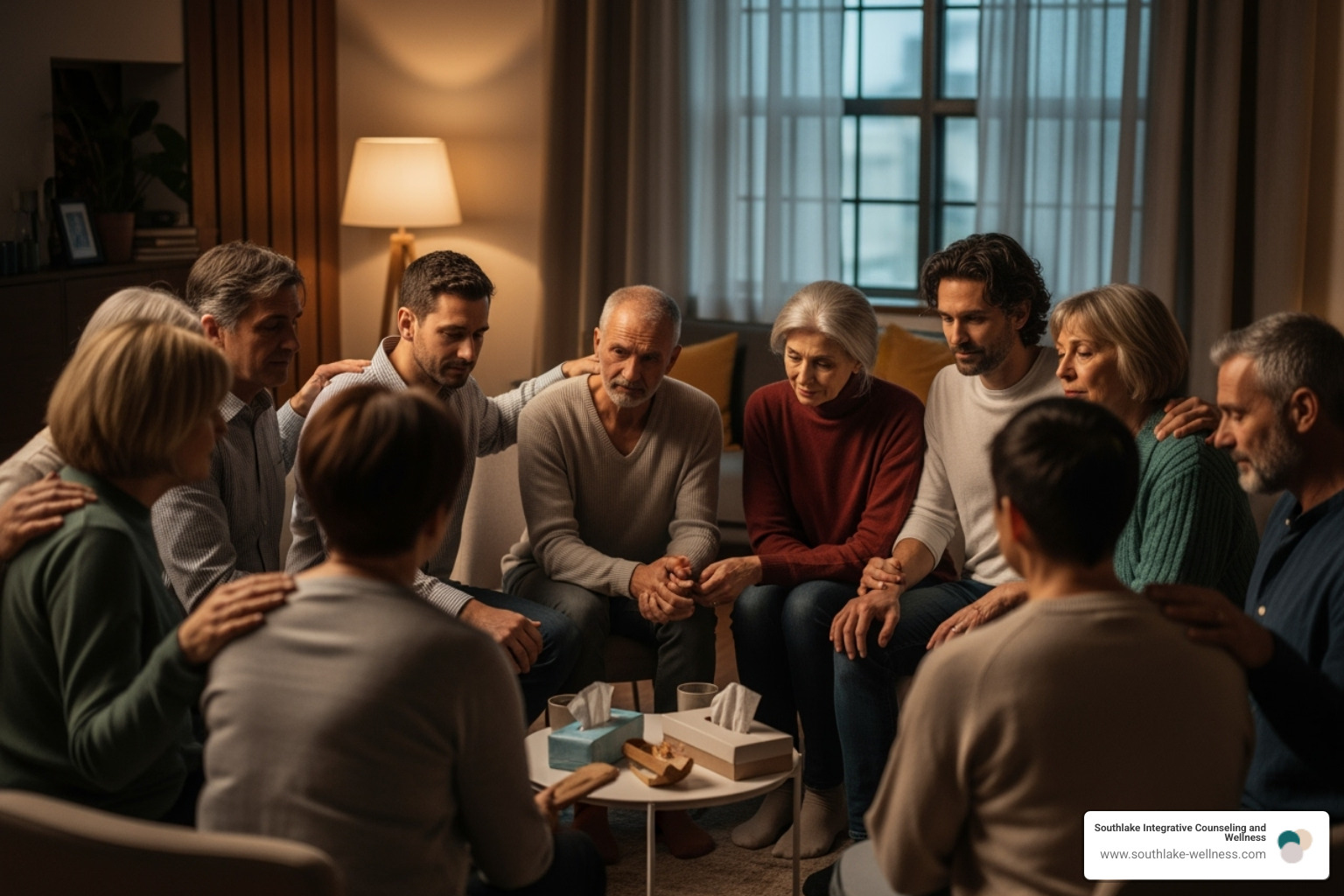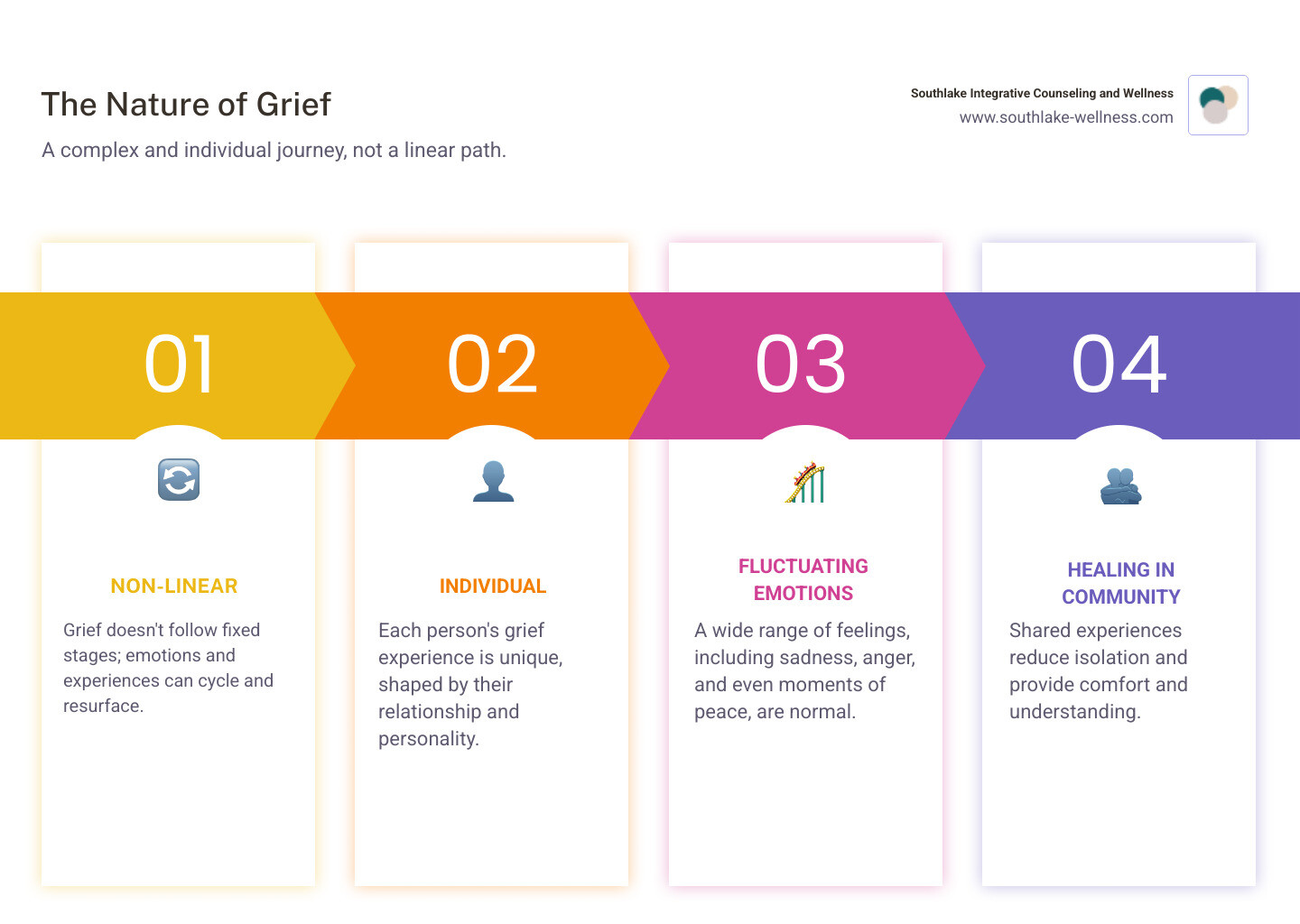
Why Grief Support Groups Are Essential for Healing
Grief support groups provide a safe space where people experiencing loss can share their stories, find comfort, and heal together. These groups offer emotional support, problem-solving assistance, information, and guidance for people who have recently lost a loved one.
Quick Overview: Finding Grief Support Groups
- What they offer: Emotional support, shared experiences, coping strategies
- Types available: Loss of spouse, child, parent, sibling, or substance-related deaths
- Formats: In-person meetings, virtual groups, open or closed sessions
- Cost: Most groups are free or low-cost ($0-$20)
- Duration: Typically 6-13 weeks with weekly meetings
- Who can attend: Adults 18+ experiencing any type of loss
Grief is a normal response to loss, but it doesn't follow neat, orderly stages. As one support group participant shared: "It helped me to know I am not alone." The unpredictable nature of grief can leave you feeling isolated and overwhelmed. That's where grief support groups become invaluable.
These groups remind us that healing happens in community. Whether you've lost a spouse, parent, child, or friend, connecting with others who understand your pain can provide the comfort and hope you need to move forward.
I'm Holly Gedwed, a Licensed Professional Counselor Associate with 14 years of clinical experience. I've facilitated grief support groups and have seen how powerful shared healing is when people support one another through loss.

Understanding the Different Types of Grief Support
When you're walking through the fog of grief, finding the right support can feel overwhelming. The beautiful thing about grief support groups is that they come in many different forms, each designed to meet you exactly where you are in your healing journey.
Think of grief support like finding the right pair of shoes – what fits perfectly for your friend might not work for you, and that's completely okay. The key is understanding your options so you can find the format and community that feels like home during this difficult time.
Bereavement programs are designed to wrap you in comprehensive care. They offer emotional support when the waves of grief feel too big to handle alone, practical problem-solving help for those everyday challenges that suddenly feel impossible, and gentle guidance as you learn to steer life after loss.
Specialized Groups for Specific Loss
One of the most powerful aspects of grief support groups is connecting with people who truly understand your specific type of loss. There's something deeply comforting about sitting with someone who gets it – really gets it – because they've walked a similar path.
Loss of a spouse or partner brings unique challenges. These groups help you steer everything from practical matters, like finances, to the deep emotional pain of facing life without your partner.
Loss of a child is often described as a devastating loss. The parent-child bond creates a unique grief. Specialized groups for bereaved parents and their surviving children focus on this unique type of loss. Some groups even support women and couples who are pregnant following a perinatal loss, helping them bond with a new baby while honoring the child they lost.
Loss of a parent as an adult brings complex emotions. You may feel your grief isn't as valid because the loss was "expected." These groups provide space to process changing family dynamics and the reality of life without a parent.
Sibling loss is often overlooked. Losing a sibling means losing a shared history and one of your longest relationships. Some organizations offer specialized virtual support for siblings navigating this unique grief.
Loss from substance use carries layers of stigma and complex emotions. These groups offer a judgment-free space to process the "what ifs" and "if onlys" that often accompany this type of loss.
Traumatic loss – whether sudden, unexpected, or violent – requires specialized support that addresses both the grief and the trauma. These groups help you process the shock alongside the sorrow.
Formats and Approaches
Grief support groups also vary widely in how they're structured and delivered, giving you flexibility to find what works best for your lifestyle and comfort level.
In-person meetings offer the comfort of face-to-face connection. There's something powerful about sharing physical space with others who understand your pain. You can see the nods of understanding or simply sit quietly together in your grief.
Virtual support groups have opened doors for many people who couldn't access in-person support. Whether you live in a rural area, have mobility challenges, or prefer the comfort of your own home, online groups can provide the same sense of community and connection.
Online forums and communities give you 24/7 access to support. When grief hits at 2 AM and you need someone who understands, these communities are there. You can share your thoughts, read others' experiences, and feel less alone.
Open versus closed groups offer different benefits. Open groups let you join whenever you're ready. Closed groups create deeper bonds as the same people journey together from start to finish.
Peer-led support groups are facilitated by people who have walked this path themselves. There's incredible power in being guided by someone who has survived what feels unsurvivable to you right now. These facilitators offer authentic empathy because they've been where you are.
Professionally-facilitated groups bring the expertise of licensed counselors or therapists who can incorporate evidence-based therapeutic techniques. This can be especially helpful if your grief is complicated by other mental health concerns.
Mindfulness-based group therapy helps you stay grounded when grief threatens to sweep you away. At Southlake Integrative Counseling and Wellness, we've seen how powerful mindfulness-based group therapy can be for managing the overwhelming emotions of grief. This approach aligns with our holistic mental wellness philosophy – healing the whole person, not just treating symptoms.
Activity-based support recognizes that sometimes words aren't enough. Art therapy lets you express what feels inexpressible. Grief walks combine the healing power of nature with gentle movement and shared stories. Music-based therapy uses songs and sounds to explore memories and emotions. Some programs even offer innovative approaches like climbing therapy, which builds resilience through physical and mental challenges.
We believe in evidence-based group therapy that honors your individual needs while providing the healing power of community connection. Your grief is unique, and your support should be too.
What to Expect from Your First Meeting
Stepping into your first grief support group meeting can feel overwhelming. Your heart might be racing as you wonder if you'll be expected to share your deepest pain with strangers, or if you'll even find the right words. These feelings are completely normal, and these groups are carefully designed to be safe, welcoming spaces where you can heal at your own pace.

The most important thing to remember is this: there's no pressure to share anything you're not ready to talk about. Simply showing up is a brave first step, and listening to others can be just as healing as speaking.
The Typical Structure of Grief Support Groups
Most grief support groups follow a gentle, predictable structure that helps everyone feel comfortable. Understanding what typically happens can ease some of your first-meeting anxiety.
Introductions and warm welcomes usually start each meeting. You won't be put on the spot; a simple introduction like, "I'm Sarah, and I lost my mom," is enough. The facilitator guides this process gently.
Group guidelines and confidentiality are established early to create trust. Facilitators emphasize that what's shared in the group stays in the group. These guidelines also cover respectful listening and honoring different ways of grieving.
The facilitator's role is to create a safe space for sharing. They may be trained volunteers with personal experience or professional counselors. They guide discussions, manage time, and ensure everyone who wants to speak gets an opportunity, offering support rather than traditional therapy.
Sharing experiences forms the heart of group meetings, but it's always optional. Often, the facilitator introduces a theme or asks a gentle question to guide the discussion. You might explore topics like "What would you want others to know about your loved one?" or "How has grief surprised you?" Listening is a powerful form of both giving and receiving support.
Guided topics and educational components are woven into many structured programs. Some groups include short videos or presentations about different aspects of grief, like understanding why it feels so chaotic or learning practical coping strategies. These elements help normalize your experience.
Sample participant guides and resources are often provided to support your journey between meetings. These might include reflection exercises or helpful tips, and having something tangible to take home can be incredibly comforting.
Practical Considerations
Before you attend, knowing some practical details can help you feel more prepared.
Group duration varies. Some groups run for specific timeframes like 6-13 weeks, while others are ongoing. Closed groups maintain the same participants throughout, while open groups welcome new members at any time.
Meeting frequency is typically weekly, though some groups meet less often. Weekly meetings often provide the most consistent support during intense grief.
Cost considerations are important. Most grief support groups are free or very low-cost, especially those offered by hospices and non-profits. When there is a fee, it's usually minimal, often just $0-$20 to cover materials. Financial assistance is often available for programs with higher fees.
The registration process depends on the group. Drop-in groups welcome you anytime, while closed groups may require advance registration. Some popular groups maintain waiting lists, so don't be discouraged if you need to wait. Most groups require participants to be adults 18+.
Small group counseling sessions are intentionally kept intimate, typically with 4-6 participants. This smaller size allows for deeper connections and ensures everyone gets adequate time to share. The intimate setting mirrors the benefits we see in our small group counseling sessions, where meaningful healing happens through connection.
Flexible options to meet your needs have expanded significantly, especially with virtual platforms. Whether you prefer meeting in person or joining from your living room, there are options available. This flexibility ensures that geography or mobility issues don't prevent you from accessing support.
The Healing Power of Shared Experience
Grief has a way of making you feel like you're living in a parallel universe. While everyone around you continues their daily routines, you're wrestling with overwhelming emotions that seem impossible to explain. This isolation is one of grief's cruelest tricks, but it's also where grief support groups reveal their true power.

When you walk into a room (or log into a virtual meeting) filled with people who truly understand your pain, something magical happens. You don't have to explain why you burst into tears at the grocery store or why certain songs make you feel angry instead of sad. Everyone gets it because they've been there too.
As one participant beautifully expressed: "The group is a safe place to talk about hard things—and heal from them." This captures the essence of what makes shared experience so powerful in healing.
Key Benefits of Group Support
The validation you receive in a grief support group is unlike anything else. When you share that you sometimes feel guilty for laughing or that you're angry at your loved one for leaving, heads nod around the room. These feelings that might seem "wrong" or "crazy" to you are completely normal responses to loss.
This sense of belonging becomes a lifeline. You're no longer the only person in your social circle dealing with profound loss. Instead, you're part of a community that understands the weight of grief and the unpredictable nature of healing.
Emotional expression flows more freely when you're surrounded by people who won't judge your tears or try to "fix" your sadness. You can share your rawest emotions without worrying about making others uncomfortable or receiving well-meaning but unhelpful advice.
Problem-solving assistance emerges naturally in these groups. Members share everything from how to handle the first holiday season to managing financial changes after losing a spouse. This collective wisdom helps you steer challenges you might not have even anticipated.
Learning from peers offers insights that textbooks can't provide. When someone shares how they got through their loved one's birthday or how they explained death to their children, you're learning from lived experience.
Hope might feel impossible when you're in the depths of grief, but witnessing others who are further along in their journey can plant seeds of possibility. Seeing someone smile genuinely again doesn't minimize your pain—it shows you that healing is possible.
Diverse perspectives you encounter help you see your own grief through different lenses. Maybe you've been stuck in anger, but hearing how someone else channeled their anger into advocacy gives you new ideas for processing your emotions.
These benefits align with our understanding of the advantages of group counseling sessions at Southlake Integrative Counseling and Wellness, where we've seen how powerful community support can be in the healing process.
Grief Support Groups vs. Individual Therapy
Both grief support groups and individual therapy offer valuable pathways to healing, but they serve different purposes. Understanding these differences can help you choose the right support for your current needs.
FeatureGrief Support GroupIndividual TherapyFocusShared experience, peer support, normalization of grief, practical coping strategies, community buildingPersonalized treatment, deep-diving into personal history, addressing specific psychological issues, trauma processingStructureOften topic-guided, facilitated peer discussion, educational components (videos, workbooks)Clinician-led, custom entirely to individual needs, flexible session contentBenefitReduces isolation, normalizes grief, provides a sense of belonging, offers diverse perspectives and coping tips, can be highly validatingAddresses co-occurring issues (e.g., depression, anxiety, trauma), explores complex family dynamics, provides targeted strategies for severe or complicated grief, offers a private, confidential space for deep personal workCostOften free or low-cost (e.g., $0-$20 for a participant guide, some suggest donations)Typically fee-based, may be covered by health insurance
Grief support groups excel at reducing isolation and normalizing your experience. When you hear others describe feelings identical to yours, it validates that you're not "going crazy" or "doing grief wrong." The community aspect provides ongoing support through the connections you build.
Individual therapy becomes essential when grief triggers deeper issues or you're struggling with complicated grief. If your loss has activated past traumas or if you're experiencing symptoms of depression or anxiety alongside your grief, personalized therapeutic intervention can be crucial.
At Southlake Integrative Counseling and Wellness, we understand how grief can sometimes evolve into more complex mental health challenges. We offer specialized support for anxiety therapy in Southlake and trauma therapy in Southlake when grief becomes complicated by these additional factors.
Many people find that combining both approaches creates the most comprehensive support system. Grief support groups provide community and normalization, while individual therapy offers personalized strategies. Both contribute significantly to your overall emotional wellness counseling journey.
The key is listening to what you need right now. Your grief journey is uniquely yours, and the support that helps you heal might change as you move through your experience.
How to Find Grief Support Groups and Other Resources
Taking the first step toward finding a grief support group can feel overwhelming, especially when you're already dealing with the weight of loss. But reaching out for support is one of the most courageous and healing things you can do for yourself. The good news? There are more resources available than ever before, both in your local community and online.

Finding Local and Online Grief Support Groups
When you're ready to begin your search, you can look for grief support groups that might be the right fit for your needs. A great place to start is by asking your healthcare provider for a referral or searching online for local options. Many community-based organizations offer bereavement support, often at no cost. It's also worth checking with your employer to see if an employee assistance program (EAP) is available to you.
At Southlake Integrative Counseling and Wellness, we regularly offer various grief support groups as part of our commitment to holistic mental health care in our community. Our therapists in Southlake, TX understand that grief affects the whole person, and we design our groups to support both emotional and physical healing. Please contact us or visit our About Us page to learn about our current group offerings.
When You Can't Find a Local Group
If you can't find a local in-person grief support group that feels right, don't lose hope. The digital age has opened up incredible opportunities for connection and healing.
Virtual support options have become increasingly popular. Many organizations now offer online groups that you can join from home, making supportive communities available regardless of your location.
Online communities and forums provide another layer of support. These platforms can connect you with others globally who understand your experience and can be especially helpful during difficult late-night hours.
Grief workbooks and self-help resources can complement group support or serve as standalone tools for processing your loss. Many reputable organizations offer books and guides that people find comforting and practical.
Emotional wellness counseling provides a personalized approach when group settings don't feel like the right fit, or when you need additional individual support. Our approach to emotional wellness counseling recognizes that grief affects every aspect of your being, and we're committed to supporting your Southlake mental health journey with compassion and expertise.
Crisis hotlines are available 24/7 for those moments when grief feels overwhelming and you need immediate support.
Seeking support isn't a sign of weakness—it's a sign of wisdom. You don't have to steer this journey alone, and there are people ready to walk alongside you as you heal.
Conclusion: Taking the Next Step on Your Healing Path
Grief doesn't follow a neat timeline or predictable pattern. It's a deeply personal journey that can feel overwhelming, isolating, and sometimes endless. But here's what I've witnessed time and again in my 14 years of clinical experience: healing is possible, and it often happens best in community.
Throughout this guide, we've explored how grief support groups can transform your healing journey. These groups offer something that well-meaning friends and family often can't provide—true understanding from people who've walked a similar path. Whether you're grieving the loss of a spouse, child, parent, or friend, there's likely a group designed specifically for your experience.
The beauty of grief support lies in its variety. You might find comfort in a traditional in-person group at your local hospice, or perhaps a virtual support group fits better with your schedule and comfort level. Maybe you're drawn to activity-based support like art therapy or grief walks. The key is finding what resonates with your healing process.
Taking that first step—whether it's researching groups online, making a phone call, or simply showing up to your first meeting—is an act of courage. You don't have to share immediately, and you don't have to have it all figured out. Sometimes just listening to others' stories can provide the comfort and hope you need.
At Southlake Integrative Counseling and Wellness, we understand that grief affects the whole person—mind, body, and spirit. Our holistic approach to mental healthcare recognizes that healing happens on multiple levels. We regularly offer various grief support groups and individual counseling services, always with an emphasis on the mind-body connection that makes our approach unique.
Your grief matters. Your healing matters. And you don't have to steer this difficult time alone. Whether through a support group, individual therapy, or a combination of both, there are people ready to walk alongside you as you find your way forward.
The path ahead may still feel uncertain, but with support and community, you can find hope, resilience, and even moments of peace again.